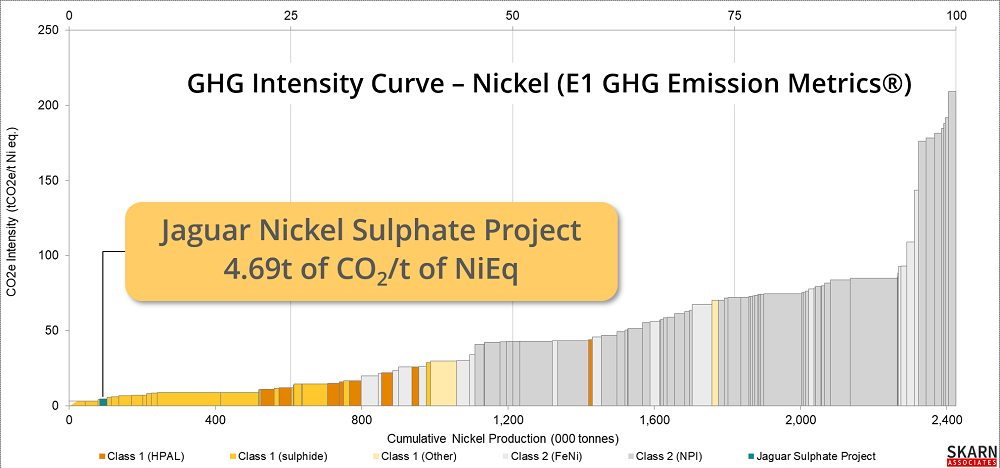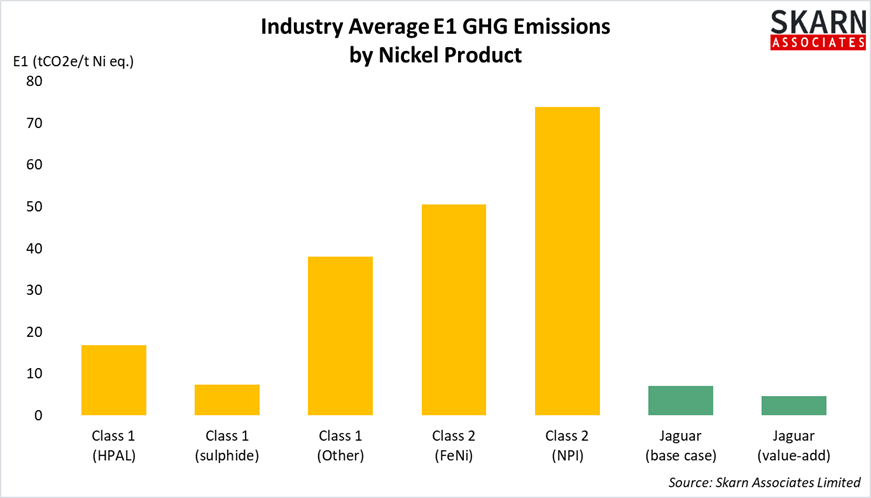Environment, Social and Governance
Centaurus Metals is committed to delivering strong ESG outcomes across every facet of our operations.
World-leading carbon potential
The Jaguar Project has the potential to become one of the world’s foremost nickel projects in terms of its carbon footprint.
Centaurus commissioned a study by specialist metals and mining ESG research company, Skarn Associates, to study the emission levels forecast to be generated from the production of nickel sulphate at Jaguar. The Skarn assessment has been based on the operating parameters set out in the Jaguar Nickel Project Value Add Scoping Study.
The results of the study are compelling and demonstrate clearly that the Jaguar Project is expected to be class-leading in terms of its carbon footprint, reflecting its unique attributes as a high-grade nickel sulphide project powered largely by renewable energy from the local grid and producing a finished (value-add) nickel sulphate product on site which can be used directly in the production of lithium-ion batteries.
When in operation, the E1 (Scope 1+2+Downstream) emissions for the production of nickel sulphate on site at Jaguar are expected to be extremely low at 4.69 tonnes of CO2/tonne of nickel equivalent, which is lower than 97% of existing global nickel production and demonstrates the investment quality of Jaguar from an emissions perspective as well a financial perspective. The graph below shows where Jaguar ranks on a global basis on the Skarn Associates GHG Nickel Intensity Curve.

The low emission levels are a function of the relatively high-grade nickel coming from open pit mining sources and, importantly, the fact that 80% of grid power in Brazil stems from renewable sources. There is an expectation that, once in operation, Jaguar’s power requirements will be met from 100% renewable sources. This has not yet been considered in the emission assessment by Skarn Associates.
Despite this, the assessed emission levels are already 85% lower than the industry average (production weighted) of 33 tonnes of CO2/tonne of nickel equivalent.

Throughout the exploration and development of Centaurus' projects, the Company has been committed to fostering close relationships with local communities, as well as ensuring we adhere to local environmental regulations. All our projects are overseen by a highly experienced Brazilian management team, enabling Centaurus to work in meaningful alignment with local practice.
A Company-wide ESG framework
In 2020, Centaurus commenced development of its formal environmental, social and governance (ESG) policy framework, which is currently based on the recommendations and principles of two different sources; being:
- Towards Sustainable Mining (TSM) Principles - a globally recognised sustainability program that supports mining companies in managing key environmental and social risks
- Principles of Responsible Investment (PRI) - a United Nations-supported international network of investors working together to contribute to the development of a more sustainable global financial system
Some of the initiatives already implemented by Centaurus in the region surrounding the Jaguar Project include:
- All Centaurus employees working on the Jaguar Project live in the local town with their families, solidifying the relationship between the Company and the local community.
- More than 90% of the current project workforce, including employees and outsourced labour, are from the south-eastern region of the State of Pará.
- More than 80% of the Company’s investment expenditure relating to exploration and development work at the Jaguar Project to date has been awarded to the local community through drilling contracts, engagement of consultants and services and purchase of equipment and supplies.
- Centaurus has constructed bridges, installed culverts and upgraded the road between the town and the Jaguar site, with further upgrades now underway in conjunction with local municipalities. The improved roads make travel for local residents significantly safer and less time consuming, particularly during the annual wet season.
- Centaurus donated a new 20,000L water tank to the village of Minerasul, the closest village to the project site.
- Collection of extensive flora, fauna, hydrological and social data in the region, which will be used to prepare the environmental and social programs to be put in place during the construction and operation of the Jaguar Project. These programs are aimed at minimising the negative impacts and maximising the positive impacts of the project.
- During the collection of social data, more than 95% of the local community interviewed was in favour of the project.


